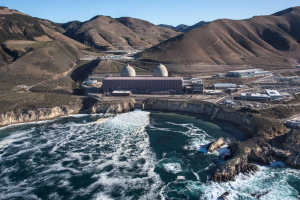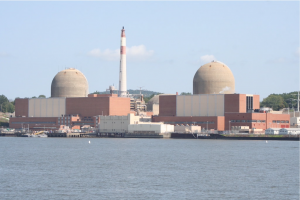 January 31, 2023
by Reilly Wright
Energy
Oceans
Renewable Energy
January 31, 2023
by Reilly Wright
Energy
Oceans
Renewable Energy
Offshore wind has been a viable energy source internationally for many years. Historically, the United Kingdom, Germany, and Denmark lead the industry’s technological development, but China is expected to have the largest cumulative installed offshore…
 November 18, 2022
by Lauren Miller
Energy
Fossil Fuels
November 18, 2022
by Lauren Miller
Energy
Fossil Fuels
New England is Facing a Gas Shortage that Could Threaten Many this Winter. What can be Done?
With winter fast approaching, many New England states and their residents are at risk of not having enough fuel to meet their heating and power generation…
 November 15, 2022
by Alex Sugg
Energy
November 15, 2022
by Alex Sugg
Energy
Congress just passed the Inflation Reduction Act (IRA) and the CHIPS and Science Act (CHIPS).[1] These bills provide for forward looking investments in nuclear energy. The IRA lists nuclear energy as a possible recipient of the $369 billion that it sets…
 November 14, 2022
by Diego Huerta
Energy
Renewable Energy
November 14, 2022
by Diego Huerta
Energy
Renewable Energy
The Infrastructure Investment and Jobs Act (A.K.A. the Bipartisan Infrastructure Bill) provides 84 million dollars over the next three years to the Department of Energy (DOE) for Enhanced Geothermal Systems (EGS) research and development.[1] EGS are used…
 October 17, 2022
by Megan Bechtel
Energy
October 17, 2022
by Megan Bechtel
Energy
On September 18, 2022, Category One Hurricane Fiona hit Puerto Rico, bringing over 30-inches of rain to some areas of the island and leaving all 1.5 million of the island's electrical customers without power.[1] Two weeks later, over 100,000 customers…
 November 2, 2021
by Steve Brenner
Climate change
Energy
Fossil Fuels
State and Local
November 2, 2021
by Steve Brenner
Climate change
Energy
Fossil Fuels
State and Local
On October 27, 2021, the New York State Department of Environmental Conservation (NYSDEC) denied two applications for proposed natural gas-fired power plants.[1] New York State has denied permit applications for fossil fuel infrastructure before,[2] but…
 October 19, 2021
by Jaclyn Lee
Energy
Renewable Energy
State and Local
October 19, 2021
by Jaclyn Lee
Energy
Renewable Energy
State and Local
In September 2021, the California Public Utilities Commission (CPUC) began its highly anticipated proceeding to reevaluate the state’s net energy metering successor (NEM 2.0) tariff. Expected no later than January 2022, the decision from the national leader in solar electricity production could have far-reaching impacts on the future of customer-owned solar generation and battery storage.
 April 20, 2021
by Blake Ellis
Climate change
Energy
Fossil Fuels
Renewable Energy
April 20, 2021
by Blake Ellis
Climate change
Energy
Fossil Fuels
Renewable Energy
In February 2021, the state of Texas experienced unprecedented power outages caused by severe winter storms. Conservative politicians and media were quick to blame the use of renewable energy as the culprit of the outages. The facts present a different explanation.
 January 22, 2021
by Farrah Yan
Energy
Renewable Energy
January 22, 2021
by Farrah Yan
Energy
Renewable Energy
COVID-19 has brought a lot of uncertainty to renewable energy projects. Even though the government recently enacted bills to extend renewable energy tax credits, whether this relief will be effective is of a question. As Joe Biden has put great emphasis on funding clean energy projects for his upcoming term, the questions are: what are some effective methods to boost the renewable energy industry? Are these methods viable under COVID-19?
 October 13, 2020
by Volodymyr Ponomarov
Energy
International
Natural Resources
Renewable Energy
October 13, 2020
by Volodymyr Ponomarov
Energy
International
Natural Resources
Renewable Energy
The European Green New Deal is an environmental plan aimed at making Europe carbon-neutral by 2050.[1] In order to achieve this ambitious goal, the European Union (“EU”) initiated the revision of a number of international agreements. Among one of those agreements is the Energy Charter Treaty (“ECT”). In July and September, 2020, the European Commission and EU Member States had two rounds of negotiations at the Energy Charter Conference dedicated to the modernization of the ECT.[2] The call for the ECT’s reform was, among other things, prompted by the ECT’s purported “serious threat to Europe’s climate neutrality target and more broadly to the implementation of the Paris Agreement.”[3]
The ECT’s modernization is important because this is the first targeted attempt to reshape the unique, legally-binding, energy-related multilateral treaty and marks a step towards compliance with the Paris Climate Accord. Additionally, modernization of the ECT provisions is relevant to U.S. companies investing in both the renewable and fossil fuel energy sectors of the ECT Member States. At this point, it is unclear how the two rounds of negotiations went and whether the actual changes are coming in the nearest future. The third round of negotiations is scheduled to take place in December 2020. This post will take a closer look at the ECT’s history, goals, and environmental standards. Furthermore, this post will address novel critiques as to its incompatibility with the Paris Climate Accord.











